
After the alphabet, mastering Afrikaans beginner words is the best place to start your Afrikaans learning journey. (Don’t have the Afrikaans alphabet under the belt yet? No problem! You should find this article and the free downloadable Guide for Beginners very useful.) Learning beginner words is essential in building vocabulary for basic communication.
If you’re busy trying to get your foot in the door and learn the basics of Afrikaans, then this is your one-stop vocabulary list for the most important Afrikaans words for beginners! For your convenience, we’ve grouped them into the main word types and included a few sample sentences to illustrate their use.
- → Also consider these 10 Great Reasons Why You Should Learn Afrikaans.
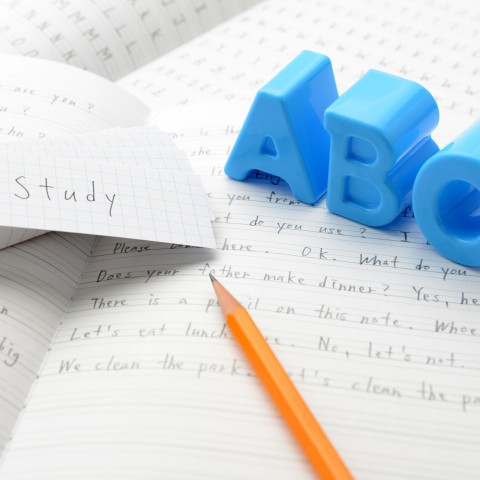
Begin Afrikaans leer met eenvoudige woordeskat. / “Start learning Afrikaans with simple vocabulary.”
 Table of Contents
Table of Contents
- Afrikaans Beginner Words – Selfstandige Naamwoorde / “Common Nouns”
- Afrikaans Beginner Words – Byvoeglike Naamwoorde / “Adjectives”
- Afrikaans Beginner Words – Voornaamwoorde / “Pronouns”
- Afrikaans Beginner Words – Telwoorde / “Counting Words”
- Afrikaans Beginner Words – Werkwoorde / “Verbs”
- Afrikaans Beginner Words – Bywoorde / “Adverbs”
- Afrikaans Beginner Words – Voegwoorde / “Conjunctions”
- Afrikaans Beginner Words – Lidwoorde / “Articles”
- Afrikaans Beginner Words – Voorsetsels / “Prepositions”
- Let AfrikaansPod101 Help You Learn Even More Afrikaans!
1. Afrikaans Beginner Words – Selfstandige Naamwoorde / “Common Nouns”
Nouns are the words we use to identify people, places, animals, and things. Beginners should focus on learning the Afrikaans words for the most familiar people as well as the most common places and items.
Fun Fact: Do you know the longest Afrikaans noun in existence? Nobody will blame you if you don’t—it’s 136 letters long and not commonly used at all!
Tweedehandsemotorverkoopsmannevakbondstakingsvergaderingsameroeperstoespraakskrywer-spersverklaringuitreikingsmediakonferensieaankondiging roughly translates to: “issuable media conference’s announcement at a press release regarding the convener’s speech at a second-hand car dealership union’s strike meeting.”
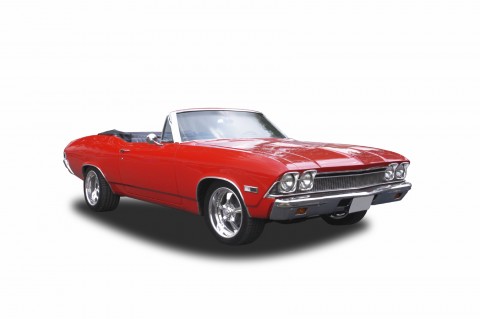
Die langste aangetekende woord in Afrikaans het te doen met ‘n persverklaring oor die uniestaking van tweedehandse-motor handelaars. / “The longest recorded word in Afrikaans is about a media release dealing with the union strike of secondhand-car dealerships.”
Note: The following nouns are all in the singular form, except for a few irregular nouns that remain identical for the plural and singular forms.
- → Learn here about the best of South African cuisine!
| Selfstandige Naamwoorde / “Common Nouns” | |
| Afrikaans | English |
| Mense en Familie / “People and Relatives” | |
| vrou, man, kind, baba | woman, man, child, baby |
| ma | mom |
| pa | dad |
| seun, dogter, meisie | son / boy, daughter, girl |
| ouma, oupa | grandmother, grandfather |
| oom, tannie Note: These nouns are the names we call our parents’ siblings. They’re also casual forms of address for Afrikaans people a lot older than us, even when we’re not related. This is a sign of respect towards older folks. The younger generation doesn’t care much how you address them, but, especially in more formal situations, it would be prudent to wait for an invitation before using people’s first names. | uncle, aunt / auntie |
| Liggaamsdele / “Body Parts” | |
| lyf / liggaam, kop, hare, oor | body, head, hair, ear |
| oog, neus, mond, tand | eye, nose, mouth, tooth |
| arm, hand, vinger, nael | arm, hand, finger, nail |
| been, voet, toon | leg, foot, toe |
| Tyd / “Time” | |
| uur, minuut | hour, minute |
| dag, week, maand, jaar | day, week, month, year |
| Beroep / “Profession” | |
| baas, werker | boss, worker |
| dokter, verpleegkundige | doctor, nurse |
| onderwyser, polisiebeampte | teacher, police officer |
| Alledaagse Items / “Everyday Items” | |
| pen, papier, potlood, boek | pen, paper, pencil, book |
| selfoon, rekenaar | cell/mobile phone, computer |
| huis, stoel, tafel, bed | house, chair, table, bed |
| bord, mes, vurk, lepel | plate, knife, fork, spoon |
| klere, broek, hemp, rok, jas, skoen/e | clothes, pants, shirt, dress, jacket, shoe/s |
| Kos en Drank / “Food and Drink” | |
| vrug, groente, vleis Note: Vleis and groente are irregular nouns that remain the same for the singular and plural forms. | fruit, vegetable, meat |
| brood, suiker, eier | bread, sugar, egg |
| pap, sous, kaas, pasta | cereal / porridge, gravy, cheese, pasta |
| water, koffie, tee, melk Note: Melk is an irregular noun as it remains the same for the singular and plural forms. Also, the Afrikaans waters (“waters”) is not a plural, but a mass name describing a big expanse of water. It’s a rather poetic term not commonly used in the vernacular. The use of the plural for tee (“tea”) is also uncommon. | water, coffee, tea, milk |
| Plekke en Geboue / “Places and Buildings” | |
| land, stad, dorp | country, city, town |
| huis, tuiste, tuin | house, home, garden |
| kerk, skool, winkel | church, school, shop |
| Diere / “Animals” | |
| kat, hond, voël | cat, dog, bird |
| slang, muis, perd | snake, mouse, horse |
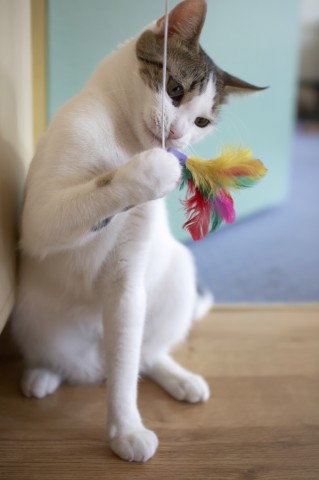
Die kat speel. / “The cat is playing.”
Got these easy Afrikaans words for beginners? Great! If you’re keen to speed up your learning, then also take a look at this article: Learn the 100 Most Common Nouns in Afrikaans.
Now for a few sentences with nouns and other basic Afrikaans words for beginners:
- My vrou is mooi. / “My wife is pretty.”
- Hy is ‘n dokter. / “He is a doctor.”
- Dit is ons huis. / “This is our house.”
- Die kat speel. / “The cat is playing.”
2. Afrikaans Beginner Words – Byvoeglike Naamwoorde / “Adjectives”
In sentences, adjectives are used to tell us more about the nouns. Adjectives possess a few characteristics:
- They can add color and vibrancy to otherwise bland language.
- Sometimes, they’re simply informative and descriptive so as to assure accuracy and understanding.
- Another feature is that they have degrees of comparison. For example: vinnig, vinniger, vinnigste / “fast, faster, fastest.”
- In a sentence, they usually appear…
- ❖ …in front of a noun, which makes them attributiewe byvoeglike naamwoorde / “attributive adjectives.” (E.g. Dit is ‘n vinnige trein. / “It is a fast train.”)
❖ …or after the linking verb, which makes them predikatiewe byvoeglike naamwoorde / “predicative adjectives.” (E.g. Die trein is vinnig. / “The train is fast.”)
Note: Did you notice how the Afrikaans adjective modifies, depending on its position in the sentence?

Die trein is vinnig. / “The train is fast.”
For the purpose of this article, we’re only listing adjectives in their predicative form. This means that if you want to form a “beginner” sentence, you can simply insert any of the following adjectives after the linking verb is.
| Byvoeglike Naamwoorde / “Adjectives” | |
| Afrikaans | English |
| vriendelik | friendly |
| nors / onvriendelik | grumpy / unfriendly |
| oulik | cute |
| goed | good |
| sleg | bad |
| vlak | shallow |
| diep | deep |
| stadig | slow |
| vinnig | fast |
| hard | hard OR loud |
| sag | soft |
| soet | sweet |
| positief | positive |
| negatief | negative |
| groot | big |
| klein | small |
| mooi | pretty |
| lelik | ugly |
| maklik | easy |
| moeilik | difficult |
| bang | scared / afraid |
| kort | short |
| vet | fat |
| maer | thin |
| ryk | rich / wealthy |
| arm | poor |
| slim | smart |
| dom | stupid |
| meer | more |
| minder | less |
| blou, geel, rooi (All colors are adjectives, only occasionally nouns.) | blue, yellow, red |
| helder | clear / bright |
| snaaks | funny |
| moeg | tired |
| bo | on top |
| onder | under / below |
| agter | behind |
| lank | long |
| suiwer | pure |
Here’s what predicative adjectives would look like in beginner Afrikaans sentences.
- Die water is suiwer. / “The water is pure.”
- Ons reis is lank. / “Our journey is long.”
- Die grap is snaaks. / “This joke is funny.”

Die grap is snaaks. / “The joke is funny.”
Ready to speak and write more descriptively? That’s great! Be sure to take a look at The Essential Afrikaans Adjectives List for more inspiration.
3. Afrikaans Beginner Words – Voornaamwoorde / “Pronouns”
Most languages have different types of pronouns, which are substitutes or “place keepers” for articles and nouns. Without them, a language would sound clumsy, because you would repeatedly be using articles and nouns (such as “the boy”, or the boy’s name—Aiden, for instance) in sentences. Pronouns allow you to sometimes replace “the boy”, or “Aiden”, with “he”, and to refer to Aiden’s possessions as “his”.
So, to be clear—in this example, “he” and “his” are two of the three types of pronouns in English.
Because pronouns are so common, have an important syntactic purpose, and are usually not that complex to learn, we’ve included them in our list of basic Afrikaans words for beginners. Also, take a look at this Best List of Must-Know Afrikaans Pronouns!
In the list below, we’ve differentiated between different types of pronouns, as this information is good to know from the onset.
3.1 Persoonlike Voornaamwoorde – Voorwerp/ “Personal Pronouns – Subject”
Note: Personal pronouns are the subject in sentences, or, in other words—they perform the action as indicated by the verb.
To illustrate with a simple English sentence: “He helps me”.
He = personal pronoun, subject (performing the action.)
me = personal pronoun, direct object (‘receiving’ the action.)
| Afrikaans | English |
| ek | I |
| u – singular and plural formal | you |
| jy – singular informal | you |
| hy | he |
| sy | she |
| dit | it |
| ons | we |
| julle – plural, informal | you |
| hulle | they |
| |

Dit styg op” / “It’s taking off.”
3.2 Persoonlike Voornaamwoorde – Onderwerp/ “Personal Pronouns – Object”
The object pronouns, as the name indicates, serve as the object in a sentence. Or, in other words, it indicates the person or object who ‘receives’ or upon whom an action is performed, so to speak.
To use our previous example sentence: “He helps me“.
He = personal pronoun, subject (performing the action.)
me = personal pronoun, direct object (‘receiving’ the action.)
| Afrikaans | English |
| my | me |
| jou – singular informal | you |
| hom | him |
| haar | her |
| dit Note: When this refers to something or someone, it’s a personal pronoun. However, like in English, it’s also used to refer to natural or other phenomena such as rain, snow, wind, haunting, etc. Then it’s called an onpersoonlike voornaamwoord (literally: “impersonal pronoun”). Such as in the sentence: Dit spook (literally: “It is haunting”) or Dit reën (“It is raining”). | it |
| julle – plural, informal | them |
| hulle | me |
| |

Die man soen haar. / “The man kisses her.”
3.3 Besitlike Voornaamwoorde / “Possessive Pronouns”
As the name suggests, these pronouns indicate possession. Some are modified depending on their position in a sentence, but we will not be looking at any modifications here.
| Afrikaans | English |
| my | my |
| jou – singular, informal | your |
| u – singular and plural, formal | your |
| sy | his |
| haar | her |
| ons | our |
| julle – plural, informal | your/s |
| hulle | their |
| |
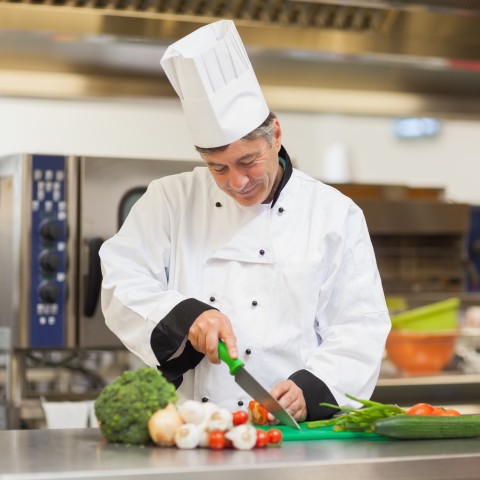
Hulle kos is lekker. / “Their food is tasty.”
3.4 Aanwysende Voornaamwoorde / “Demonstrative Pronouns”
These pronouns are used to indicate something specific in a sentence. Beginners only need to master one.
| Afrikaans | English |
| dié Note: This can be a pronoun OR an article, depending on whether it’s used with a noun. Often, die is pronounced with emphasis when it’s used as a pronoun. | this |
| |
3.5 Vraende Voornaamwoorde / “Interrogative Pronouns”
These pronouns appear most often at the start of a sentence, or alone as a question. Here are the beginner ones.
They’re also referred to as “question words” and many of them start with “W”.
| Afrikaans | English |
| Wat? | What? |
| Wie? | Who? |
| Waar? | Where? |
| Wanneer? | When? |
| Hoe? | How? |
| |

Waar is die badkamer? / “Where is the bathroom?”
4. Afrikaans Beginner Words – Telwoorde / “Counting Words”
These words always have something to do with numbers. The only type of counting word we’re going to look at here is called bepaalde hooftelwoorde (approximate: “primary counting words”). These are basically the names of numbers.
When you’re studying a new language, numbers are important to learn right from the start. They’re used to indicate important things such as the date and time, age, quantity, and lots more!
The numbers one through ten are very easy Afrikaans words for beginners. However, if you’re looking to learn more about the subject, you might find this article helpful: The Best Tips About Afrikaans Numbers 1 – 30 and Beyond.
| Telwoorde / “Counting Words” | |
| Afrikaans | English |
| 1. een | one |
| 2. twee | two |
| 3. drie | three |
| 4. vier | four |
| 5. vyf | five |
| 6. ses | six |
| 7. sewe | seven |
| 8. agt | eight |
| 9. nege | nine |
| 10. tien | ten |
| |
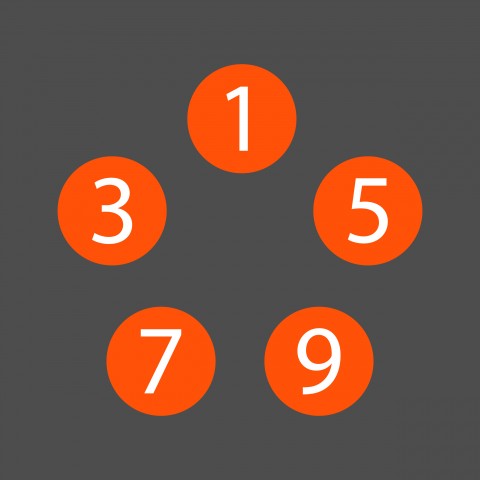
Ongelyke getalle / “Odd numbers”
5. Afrikaans Beginner Words – Werkwoorde / “Verbs”
Verbs, as you know, are the words that name the action or actions in a sentence.
When learning a new language, these are crucial words to know and might possibly be the most difficult to learn. This is because verbs, being action words, also tend to be the ones that change according to tense. This change in verbs is called “conjugation”.
| Grammar Tip: Conjugations also appear in Afrikaans, but fortunately, learning these tense-based adaptations of verbs is not that difficult. One of the reasons for this is that, in Afrikaans, the verb form does not change for different persons. We only use verb conjugations for time! Most languages share this feature. Conjugation often includes the following features:
|
- ➢ If you’d like to learn more about grammatical details about Afrikaans verbs, also have a look at this article.
For the purposes of this article, we’ll be looking at the different types of Afrikaans verbs, with a brief overview of how to use them in the present tense only. The present tense refers to actions taking place in the present, and in Afrikaans, it’s easy to learn. Unlike in English, there are no additional forms of the present tense (such as the present continuous tense, for instance).
What’s important is that the present tense refers to something that is always true or done on a regular basis. It’s also used for something that is occurring now.

Hulle loop. / “They are walking” OR “They walk.”
5.1 Hoofwerkwoorde / “Independent Verbs”
These are the most commonly used verbs in the present tense.
| Afrikaans | English |
| loop | walk (or run, for water) |
| staan | stand |
| sit | sit |
| lê | lay |
| slaap | sleep |
| droom | dream |
| hardloop | run |
| draf | jog |
| pak | pack |
| studeer | study |
| skryf | write |
| tik | type |
| speel | play |
| werk | work |
| kry | get / fetch |
| nooi | invite |
| swem | swim |
| fliek | movie |
| kies | choose |
| mis | miss |
| kuier | visit / hang out |
| betaal | pay |
| help | help |
| toer | tour |
| gee | give |
| neem / vat | take |
| bly | stay |
| gaan | go |
| reën | rain |
| maak | make |
| praat | talk |
| hou van | like |
| vind | find |
| dink | think |
| koop | buy |
| verkoop | sell |
| bring | bring |
| bel | phone |
| vra | ask |
| sien | see |
| roep | call |
| weet | know |
| dink | think |
| praat | talk |
| gesels | chat |
| lag | laugh |
| skree | shout |
| huil | cry |
| waai | wave |
| kyk | look |
| luister | listen |
| eet | eat |
| proe | to taste |
| drink | drink |
| herhaal | repeat |
| stuur | send |
| |

Hy droom. / “He is dreaming.” OR “He dreams.”
5.2. Koppelwerkwoorde / “Linking Verbs”
Linking verbs are those words in sentences that join a subject with a specific word or phrase that gives more information about it (the subject).
Linking verbs are easily confused with main verbs, but as I mentioned before, they are always followed by an adjective, i.e. a word or phrase that qualifies the subject in a sentence.
| Koppelwerkwoorde / “Linking Verbs” | |
| Afrikaans | English |
| is | is |
| smaak | tastes |
| klink | sound |
| ruik | smell |
| lyk | look |
| voel | feel |
| |

Ek voel goed. / “I feel good.”
6. Afrikaans Beginner Words – Bywoorde / “Adverbs”
Adverbs are verbs’ best friends—they tell us more about them.
Note: You’ll see that adjectives and adverbs have similar functions and that their differentiation depends on the presence of a main verb. Just like adjectives, adverbs add flavor and flair to language, as well as details to increase accuracy and specificity.
As you’ve already learned, the linking or be-verb (koppelwerkwoord) is / “is” in a sentence indicates that the following word (or phrase) could be an adjective because it qualifies the noun.
| Grammar Tip: If there’s no linking verb in a sentence, it indicates that you’re probably dealing with an adverb. For instance:
|
In Afrikaans, we have different types of adverbs, of which the following will be good to know as beginner words in Afrikaans:
- Bywoorde van wyse – “Adverbs of manner”
- Bywoorde van plek – “Adverbs of place”
- Bywoorde van tyd – “Adverbs of time”
- Bywoorde van graad – “Adverbs of degree”

Hulle loop stadig. / “They walk slowly.” OR “They are walking slowly.”
6.1 Bywoorde van Wyse / “Adverbs of Manner”
Adverbs of manner tell us more about the nature of common verbs.
| Afrikaans | English |
| hard | loudly / hard |
| sag | softly |
| hoog | highly |
| laag | low |
| wonderlik | wonderfully |
| goed | well |
| sleg | badly / poorly |
| heerlik | Approximate: tasty, wonderful |
| vinnig | fast |
| stadig | slowly |
| bang | scary |
| moeg | tiredly |
| |
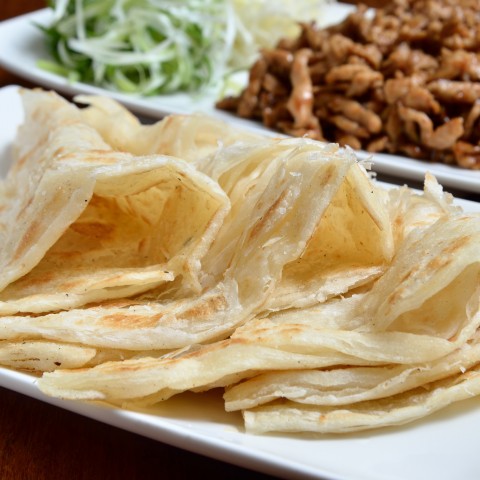
Die pannekoek smaak heerlik. / Approximate: “The pancake tastes wonderful.”
6.2 Bywoorde van Plek / “Adverbs of Position/Place”
As you can probably guess, adverbs of position tell us more about where an action takes place.
| Afrikaans | English |
| buite | outside |
| binne | inside |
| orals | everywhere |
| hier | here |
| daar | there |
| |
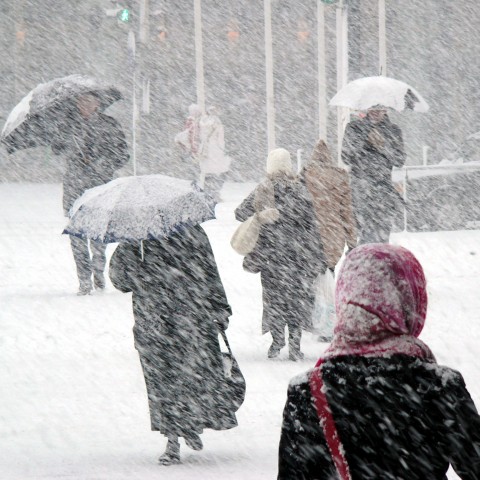
Dit sneeu buite. / “It snows outside.”
6.3 Bywoorde van Tyd / “Adverbs of Time”
These adverbs will answer questions related to time, such as “When?” or “What day?”
| Afrikaans | English |
| vandag | today |
| gister | yesterday |
| more | tomorrow |
| nou | now |
| dan | then |
| later | later |
| |
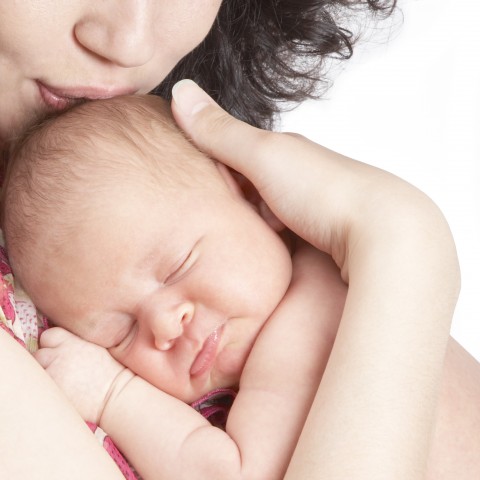
Nou slaap die baba. / “Now the baby sleeps.”
6.4 Bywoorde van Graad / “Adverbs of Degree”
These adverbs are often words that answer the question: “How much?” Just like in English, they indicate the intensity of an act. While you’re still mastering the basics of Afrikaans, you only need to know this one:
| Afrikaans | English |
| baie | very |
| |
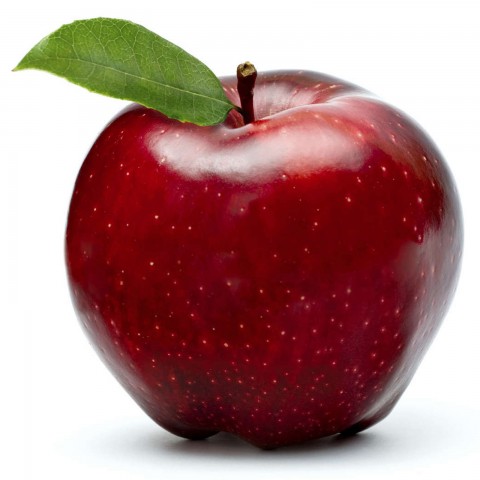
Die appel lyk baie goed. / “The apple looks very good.”
7. Afrikaans Beginner Words – Voegwoorde / “Conjunctions”
As you know, conjunctions are the so-called glue-words in Germanic languages. Their purpose is simple; they combine words, phrases, clauses, and sentences. For the purpose of this article, we’ll only look at the basics.
- ➢ To learn more, be sure to study this Afrikaans conjunctions article.
| Afrikaans | English |
| maar | but |
| en | and |
| want / omdat | because |
| of | or |
| |

Die weer is koud en nat. / “The weather is cold and wet.”
8. Afrikaans Beginner Words – Lidwoorde / “Articles”
Just like English, Afrikaans has only two articles—‘n (“a”) and die (“the”)—and in a sentence, they always take position ahead of a noun.
Die is a bepaalde lidwoord (“definite article”) that refers to something or someone specific. It’s used for both singular and plural nouns.
|
9. Afrikaans Beginner Words – Voorsetsels / “Prepositions”
Prepositions are the last basic Afrikaans words for beginners that we’re going to look at. In a sentence, prepositions indicate the relative position of or the relationship between two separately expressed concepts.
Note: They can indicate place and are therefore easily confused with adverbs of place, but don’t worry about that distinction too much at this point. Just learn the following, as they’re the most frequently used Afrikaans prepositions.
| Voorsetsels / “Prepositions” | |
| Afrikaans | English |
| bo / bo-op | on (top of) |
| onder | under |
| in | in |
| uit | out |
| |

Ek sit op die stoel. / “I’m sitting on the chair.” OR “I sit on the chair.”
And that’s it, your list of easy Afrikaans words for beginners!
10. Let AfrikaansPod101 Help You Learn Even More Afrikaans!
In this article on words in Afrikaans for beginners, you learned the core words you should know in a variety of categories. But don’t stop here!
AfrikaansPod101 has so much more in store for you.
When you sign up, you get instant access to tools like:
1. The Afrikaans Core 100 Word List
2. A new Afrikaans word to learn every day
3. An extensive vocabulary list library, regularly updated
4. A free Afrikaans online dictionary
5. Monthly video talks and shows to help you learn easier and faster, and stay motivated
Don’t hesitate to subscribe now! With our excellent Afrikaans word lessons for beginners, you’ll build a solid foundation to help you master the language and sound like a native in no time.
Before you go: How many of these words did you know already? Let us know in the comments!
About the author: Christa Davel is a bilingual (Afrikaans and English) freelance writer and journalist, and is currently based in Cape Town, South Africa. She’s been writing for InnovativeLanguage.com since 2017.










